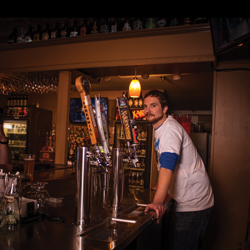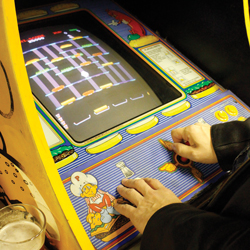There’s a new beercade in town, so hop on your hoverboard and come on down!
The Internet recently went abuzz over “Back to the Future Day,” a time for putting aside our social-media disagreements and grievances to collectively celebrate that moment from the hallowed film trilogy in which Marty McFly and Doc Brown time-travel to the far-off, futuristic date of October 21, 2015. In the weeks leading up to that day, cast reunions, articles, viral videos and more came shooting at us from every angle, at a rate of 1.21 gigawatts.
Speaking in my best hyperbole as a pop culture nerd and social media cynic, I think it’s the greatest thing Internet culture has ever spawned. For one brief shining moment, we were all united and everyone could agree on something—that Back to the Future was the greatest film franchise ever (and then another Episode VII trailer was released, and we came back down out of the clouds). But I’m sure when Back to the Future II was released 26 years ago, nobody predicted the impact it would one day have on that specific date—especially since most of us back then had never heard the word “Internet,” the very thing that helped perpetuate the phenomenon.
Now that the film’s future is in the past, we can chuckle at many of the predictions they didn’t quite get right about our now-present day: cars don’t fly, clothes don’t lace or dry themselves, and the Cubs did not win the World Series this year (but gosh darn it, did they come close!). What it did get right, however, can be found in the film’s “Café 80s” scene—we can still go out and play the vintage arcade games we remember fondly from childhood…
The Playthings of Eras Past
It’s a collective, sometimes obsessive thirst for nostalgia that motivates many of us to still play music from vinyl records and handwrite deliverable mail. As collectors, we discourage opening toys from their packaging because “they might be worth something someday,” and one can find museums devoted to virtually anything, including the playthings of eras past. The original, mechanical Fascination games and Pachinko machines—like those once played on seaside boardwalks or at Peoria’s own, long-gone Al Fresco Park—were seen as frivolous entertainment in their day, but are now considered “precious.” Even in nearby McLean, Illinois, just off Route 66, there is an arcade museum where all of its artifacts are still “playable,” and probably one of the only museums in existence where guests are encouraged to touch and handle what they see on display.
The Internet was among several contributing factors that closed many of the video arcades we knew in the ‘80s and ‘90s, especially when the same or similar games could be found in home gaming systems and computers. Unable to thrive purely on our fistfuls of quarters, it’s been well over a decade (and inching ever closer towards two decades) since favorite local haunts like Aladdin’s Castle at Northwoods Mall and Fun City Arcade at Landmark have closed their doors and given way to different spaces.
And while traditional arcades have dwindled—and we can now conveniently carry an entire arcade’s worth of games on our own mobile devices—the games we knew from yesteryear can still be played in their original, boxy forms at something known as a “beercade,” a concept that has been successful in larger markets for some time. Combining our favorite old-school video games with our favorite new-school beers and cocktails, beercades thrive on the mash-up of two things people love (beer and arcades—get it?!), as well as the supposition that “everything old is eventually new again.”
Meanwhile, Back in Peoria
Lucky for us, it was only a matter of time before someone dared attempt the concept here, and that person was Jason Pacey. After a soul-searching trip through Europe just over a year ago, he found himself back in Peoria, “bored” and “looking for something to do.” A friend mentioned the growing popularity of these beercades—and how Peoria desperately needed one—and pushed him to pursue the venture. While first entertaining the notion of taking on partners, Pacey ultimately decided to create “8 Bit Beercade” all on his own after visits to several places including Headquarters, a successful beercade with a couple of locations in the Chicagoland area.

A beercade’s greatest appeal is the quality and selection of its games, and that was Pacey’s top priority in the creation of 8 Bit. Months were spent accumulating an impressive collection of classic arcade cabinets through Craig’s List, eBay and word of mouth. This piecemeal method was really the only way to quickly acquire the “dream list” of games he knew he had to have. At last count, he had collected close to 35 machines—“the biggest selection in the area,” he proudly states.
With his biggest asset under control, the next step was finding a suitable location, as Pacey’s house and garage, which housed all the games during the collection process, were not going to suffice. Downtown Peoria, and specifically its burgeoning Warehouse District, was always his ideal location for 8 Bit; its revitalization and sense of renewal was the perfect place to house dozens of vintage video games and attract the young (and not-so-young) crowds to which the beercade would cater.
After exploring a few options, he found a home at the corner of State and Water streets, where just a block away, Richard Pryor now stands, inoffensively frozen in bronze for all time. The space is a familiar one, having housed several small restaurants in the recent past. But with little to no need for a kitchen, that area was converted into an annex for more games (Please note, however: you can enjoy light snacks and Butch’s pizzas if desired). The additional rooms offer a throwback sensation that one always got from the mall arcades and hotel game rooms of years past: fluorescent lights beaming down onto rows of game cabinets wedged into every nook and cranny, leaving just enough space for a few homemade wood stands designed to hold your drinks while you play—an ingenious touch crafted by Pacey and a friend. “You gotta have somewhere to set your drink,” he reasons.
Come For the Games…
And play you do. So far, 8 Bit really is playing in Peoria, as classic titles like Pac-Man (Mr. and Ms.), Burgertime, Dig Dug and many others have come roaring back to life at State and Water. The selection even includes latter-day titles from the days when violence was the trend—your Street Fighters, your Mortal Kombats, etc.
You can even find a game that hits (quite literally) close to home in Rampage, in which players assume the roles of large, Godzilla- and King Kong-like creatures, whose objective is to destroy entire cities, “Wreck-It Ralph” style. The first city destroyed in the game? Peoria, Illinois. As gauche as the idea of giant creatures destroying our fair city sounds, seeing “Peoria, Illinois” flash across the screen still conjures that same twinge of pride and excitement you feel anytime your hometown is mentioned in movies or on television.
Of course, it’s all fun, but it’s not all games at 8 Bit. A beercade needs beer of course, and 8 Bit boasts one of the largest craft beer selections you can find in the area—upwards of 130 choices in their coolers and on tap. In fact, while the name “8 Bit” refers to the graphics processors used in most video games in the 1980s, it’s also the name of one of their most popular IPAs. And they taste even better as you play your favorite video games, which by the way, have I mentioned they are all free to play? I didn’t? Oh good, I thought it would make for a great surprise as we begin to wrap this up. Yes, the games at 8 Bit are free to play, and that is one of the true allures of the beercade: come for the drinks, stay for the games (or the other way around, if you prefer).

The Future at Present
So, now that we are officially “in the future,” what does it hold for 8 Bit? Well, owner Jason Pacey still has his hands pretty full with its newness, and plans to continue business as usual for now as they gain their bearings. He hopes to eventually host game tournaments and has begun monthly “firkin” events (no, that’s not a Pryor-esque obscenity—it’s a craft beer thing). And he still finds himself on the hunt for reliable, working versions of several games he’d like to have in the bar’s rotation. “Reliable” and “working” are two very operative words here, as many of the cabinets are 20 or even 30 years old. And just like a used car, once it’s off the lot, you’ll eventually need to address maintenance issues, which Pacey manages thanks to a local “arcade repairman” who once repaired and maintained the machines in Landmark’s arcade. I suppose it takes solid upkeep to bring games from the past successfully into the future, especially since they don’t run on Mr. Fusion… yet.
When asked what the feedback on 8-Bit has been like, Pacey shrugs modestly. “People tell me ‘thank you for opening this place,’” he says, “which is odd because I’ve never gone to a bar and thanked its owner for existing… but the nostalgia factor makes it work.”
And as he caps that statement with an ironic chuckle, you can hear the familiar sounds of Pac-Man breezing through the neon labyrinth glowing in the background. a&s


